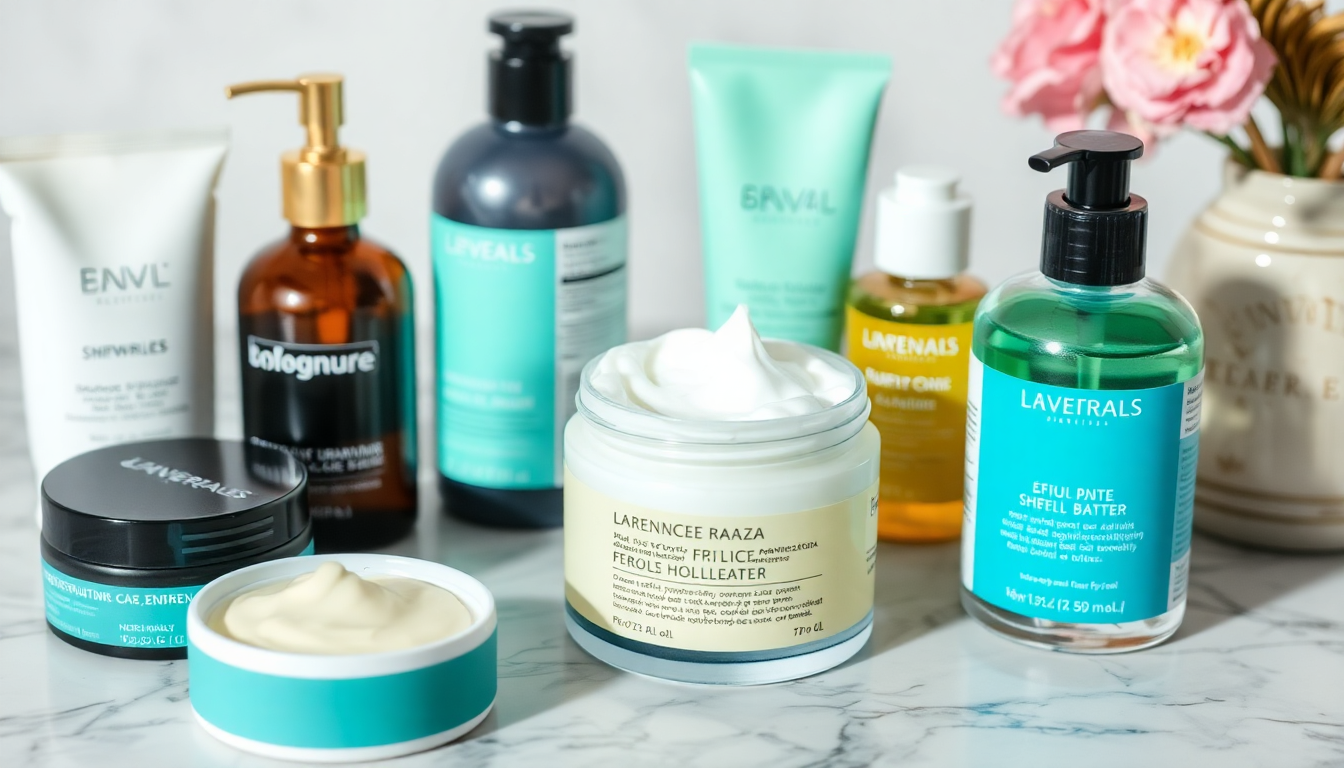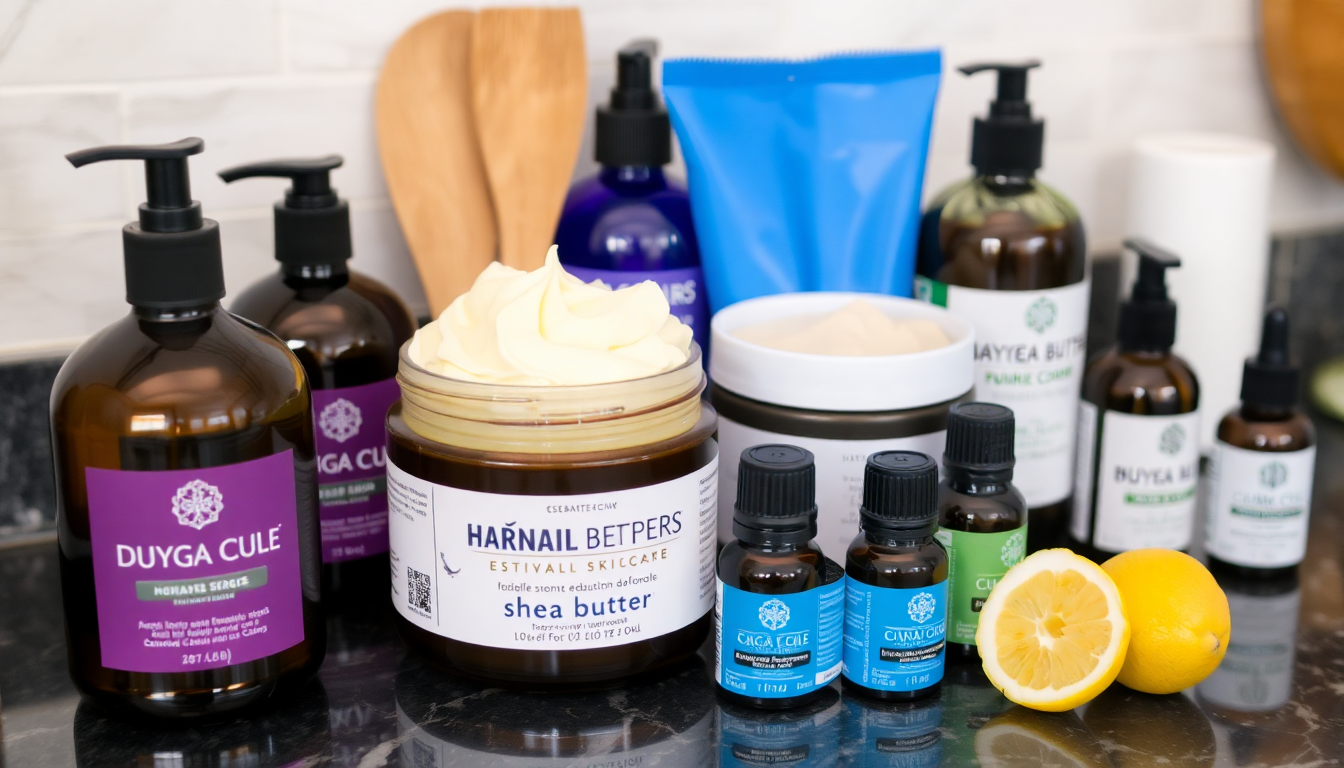Introduction
Your skin is the largest organ of your body, and it deserves the utmost care and attention. A well-structured skincare routine can significantly impact your skin's health and appearance. In this comprehensive guide, we will delve into how to unleash your skin's potential by incorporating exfoliation, shea butter, and essential oils into your daily regimen. Whether you have oily, dry, or combination skin, this routine is designed for both men and women, ensuring that everyone can achieve a radiant and youthful complexion.
The Importance of Exfoliation
Exfoliation is a crucial step in any skincare routine. It involves the removal of dead skin cells from the surface of your skin, promoting a brighter and smoother complexion. Here are some compelling reasons to prioritize exfoliation:
- Promotes Cell Turnover: Exfoliating encourages the body to shed dead skin cells and generate new ones, leading to healthier skin.
- Unclogs Pores: Regular exfoliation helps remove dirt, oil, and debris that can clog pores, reducing the likelihood of breakouts.
- Improves Skin Texture: By sloughing off dead skin, exfoliation enhances the overall texture and tone of your skin, making it softer and more radiant.
- Enhances Product Absorption: Exfoliated skin is better at absorbing serums and moisturizers, allowing your products to work more effectively.
- Reduces Signs of Aging: Exfoliation can help diminish the appearance of fine lines and wrinkles by promoting collagen production.
To get the most out of exfoliation, consider using products containing alpha hydroxy acids (AHAs) or beta hydroxy acids (BHAs). A gentle scrub can also work wonders. Aim to exfoliate 2-3 times a week, depending on your skin type.
Choosing the Right Exfoliant
When it comes to exfoliation, choosing the right product is essential. Here are some types of exfoliants to consider:
- Physical Exfoliants: These contain small particles that physically remove dead skin cells. Look for gentle options to avoid damaging your skin.
- Chemical Exfoliants: AHAs (like glycolic and lactic acid) and BHAs (like salicylic acid) dissolve dead skin cells without scrubbing. They can be more effective and less abrasive than physical scrubs.
- Enzyme Exfoliants: Derived from fruits, these natural exfoliants work by breaking down dead skin cells. They are suitable for sensitive skin types.
Always patch-test new exfoliating products to ensure they are compatible with your skin type and sensitivities.
Incorporating Shea Butter
Shea butter is a luxurious natural moisturizer derived from the nuts of the shea tree. Its rich composition makes it an excellent addition to any skincare routine. Here are some of the remarkable benefits of shea butter:
- Deeply Hydrates: Shea butter is rich in fatty acids, allowing it to penetrate deeply into the skin and provide lasting hydration.
- Soothes Irritation: Its anti-inflammatory properties make it ideal for soothing dry, irritated skin and conditions like eczema.
- Provides Antioxidants: Shea butter contains vitamins A and E, which help protect the skin from environmental damage and free radicals.
- Improves Elasticity: Regular application can help improve skin elasticity, reducing the appearance of stretch marks and scars.
- Acts as a Barrier: Shea butter creates a protective barrier on the skin, shielding it from harsh environmental elements.
To incorporate shea butter into your routine, apply a generous amount after exfoliating. It can also be used as a nighttime moisturizer for extra hydration.
Choosing Quality Shea Butter
Not all shea butter is created equal. Look for unrefined, organic shea butter for the best results. Unrefined shea butter retains more of its beneficial properties compared to processed versions. You can also choose between:
- Raw Shea Butter: This is in its natural state and retains its nutrients.
- Refined Shea Butter: This has been processed and may have additives, which can reduce its benefits.
To get the most benefit, opt for raw or organic shea butter that is free from additives and chemicals.
The Magic of Essential Oils
Essential oils are concentrated plant extracts renowned for their therapeutic qualities. They can elevate your skincare routine by addressing specific skin concerns and adding delightful fragrances. Here’s how to effectively incorporate essential oils:
- Tea Tree Oil: Known for its antibacterial properties, tea tree oil is a great choice for those with acne-prone skin. It helps reduce inflammation and redness.
- Lavender Oil: This calming oil is excellent for sensitive skin. It promotes healing and reduces irritation while also providing a relaxing aroma.
- Frankincense Oil: Often referred to as the “king of essential oils,” frankincense has anti-aging properties and helps improve skin tone and elasticity.
- Rosemary Oil: Rich in antioxidants, rosemary oil stimulates circulation and promotes healthy skin rejuvenation.
- Geranium Oil: Known for balancing skin oils, geranium oil can help with uneven skin tone and improve the overall texture.
When using essential oils, always dilute them with a carrier oil, such as jojoba, coconut, or almond oil. A few drops mixed with a carrier oil can be applied directly to your skin.
Creating Your Ultimate Skincare Routine
To unleash your skin’s potential, follow this structured skincare routine:
- Cleanser: Start your routine with a gentle cleanser tailored to your skin type. This will remove impurities and prepare your skin for the next steps.
- Exfoliation: Exfoliate 2-3 times a week to remove dead skin cells and promote cell turnover.
- Toner (Optional): If you use a toner, apply it after cleansing to balance your skin's pH and prepare it for moisturizers.
- Moisturizer: Apply shea butter or a suitable moisturizer daily to keep your skin hydrated. For daytime use, consider a lighter formula, while a richer cream may be ideal for nighttime.
- Essential Oils: Incorporate essential oils into your routine as needed, mixing them with your moisturizer or applying them directly to problem areas.
- Sun Protection: Don’t forget to apply sunscreen during the day to protect your skin from harmful UV rays.
Consistency is key in skincare. Stick to your routine and make adjustments based on how your skin reacts over time.
Additional Tips for Healthy Skin
In addition to your skincare routine, consider these tips for maintaining healthy skin:
- Stay Hydrated: Drink plenty of water throughout the day to keep your skin hydrated from the inside out.
- Eat a Balanced Diet: Incorporate fruits, vegetables, and healthy fats into your diet to nourish your skin.
- Get Enough Sleep: Aim for 7-9 hours of quality sleep each night to allow your skin to repair itself.
- Manage Stress: High stress levels can negatively impact your skin. Engage in activities that promote relaxation, such as yoga or meditation.
- Limit Alcohol and Smoking: Both can dehydrate your skin and accelerate aging, so it's best to minimize or eliminate these habits.
Conclusion
By incorporating exfoliation, shea butter, and essential oils into your skincare routine, you can unlock the full potential of your skin. This comprehensive approach not only enhances your complexion but also provides long-lasting health benefits. Remember, the journey to beautiful skin takes time and consistency, so embrace the process and enjoy the results. With dedication and the right products, you can achieve glowing, healthy skin that radiates confidence!




Hinterlasse einen Kommentar
Diese Website ist durch hCaptcha geschützt und es gelten die allgemeinen Geschäftsbedingungen und Datenschutzbestimmungen von hCaptcha.